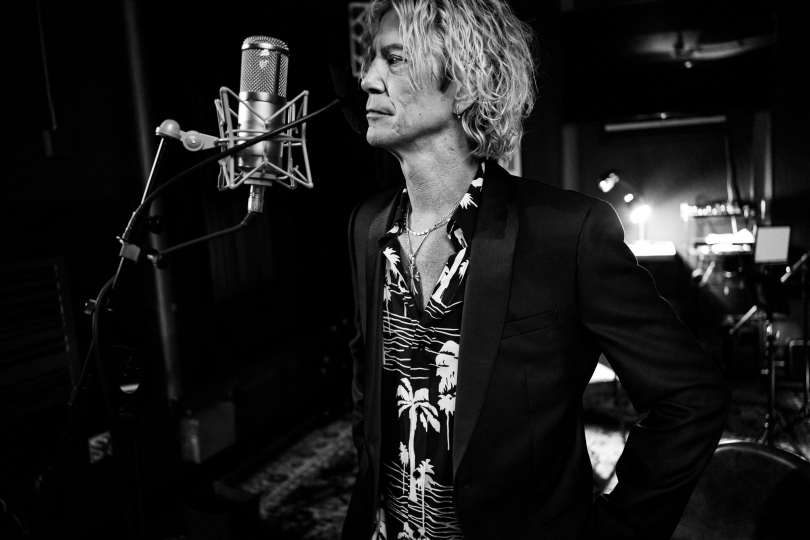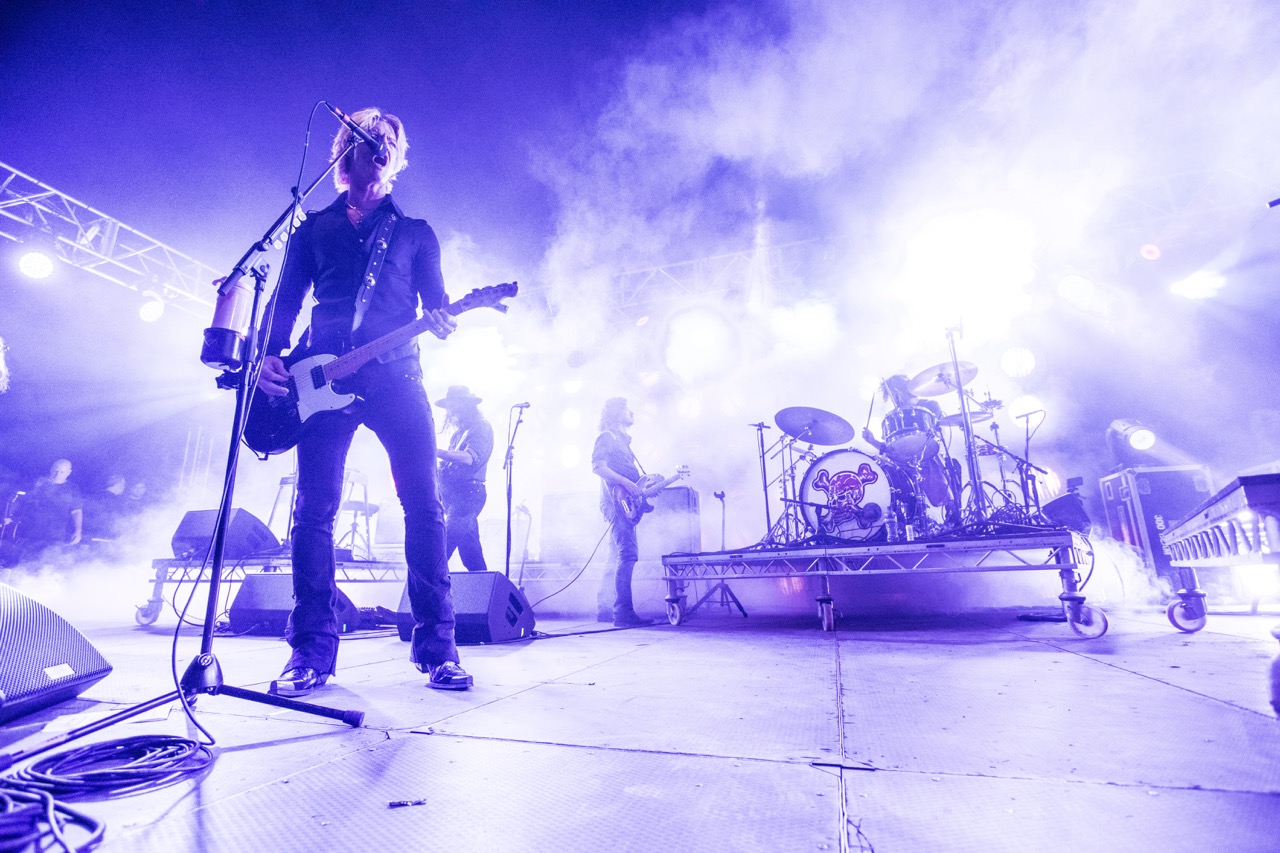
Duff McKagan: I’m a Guy Who Doesn’t Change the Gear
He's done almost everything. He is a member of Guns N' Roses, one of the most successful bands in rock history, with whom he stormed the charts in the early 1990s. His dangerous lifestyle nearly cost him his life. But then a turning point came, and bassist Duff McKagan chose sobriety. The wild rocker who lived by the motto "Too Fast To Live" suddenly became a loving husband and responsible father while he was playing with the supergroups Neurotic Outsiders and Velvet Revolver, led his own band Loaded and became a strong songwriter on his last two albums Tenderness and Lighthouse. Duff ticks all the boxes for a rock star, yet he couldn't be further from that designation. He keeps his feet on the ground, not lacking in modesty and humility. During the interview he was full of positive energy, he was funny and when he talked about music and his heroes, he exuded as much enthusiasm as if he were still that punk rock teenager. Duff McKagan will perform on 11th October at the Sono Centrum in Brno.
Duff, you're always working on something, touring with Guns N' Roses, recording solo albums or playing on other people's records. It doesn't look like you're gonna slow down. Do you consider yourself a workaholic?
Yes, probably. I'm in the creative place now. I've been here for the last eight or nine years. I've written songs for my Tenderness and Lighthouse records, for Ozzy, Iggy and so on. Things are just kinda flowing. And I have my own studio now which I got in 2019. It's four minutes from my house. The way I write songs is like, "This morning, I'm going to do some interviews, but I'm gonna record this song later today." Because it's right there. Plus, studio sounds so good and all of that. These things kind of push me that I want to create and work.
And Guns, it´s just awesome. We tour, we play amazing gigs around the world. It's unbelievable. Friends of mine ask me to play on their records. I play on Jerry Cantrell's record. I know I'm giving you a very long answer, but yeah, I just like to work.
Last year you released a successful album Lighthouse. How do you look at the album now? Are you satisfied with it or are there things you would change if you could?
No, I wouldn't change anything. I had a lot of songs to choose from for Lighthouse. I know this is like chapter one from all of these recordings. I know what the next record is, even the next record after that, because I really have a lot of material. It's kind of set up, from Tenderness to Lighthouse to the next one. It's been really fun last month rehearsing this with the band I'm going on tour with. I did the songs really on my own, maybe a drummer came in or whatever but putting a band together is really cool – the songs coming alive.
You started out as a drummer and on Lighthouse you play the drums for some songs, just like on your solo debut Believe In Me. Do you play the drums often and regularly or do you only return to them occasionally?
I should go. I keep telling myself, "Go practice the drums, learn some new beats," but I just don't do it. Sometimes there's just no drummer available, especially during the covid time. I've learned how to play with a click track, which is kind of new to me. Sometimes I know the beat for the song that I want there. If it's an unusual drum beat, I'm probably the right person to play it. Because other people look at my drum beats sometimes like, "What? I don't get it." So yes, I play drums, but I don't practice like I should.
I heard you used the same drum kit as on Believe In Me, is that true?
You know, I'm a guy who doesn't change the gear. If something works, it works. I'm not a gear searcher type of guy at all.
I think they were Yamaha?
Yeah. I've got a bunch of different snares which I've collected over the years. And obviously, I got a new cymbals when needed but the drum kit just sounds great.
When you got off drugs and alcohol in '94, martial arts helped you on that journey, both physically and mentally. Did it affect you as a musician as well? Like suddenly having more self-discipline, so you started practicing the guitar more and was more interested in music?
First I was terrified. The first few weeks I'd been sober, I was like: "I don't know if I can play on the stage again." I thought, "People could stare at me and it's going to make me nervous. Am I gonna fuck up because I'm so tight? Nothing will make me loose, no alcohol, nothing." The first gig I played was with Steve Jones, with the Neurotic Outsiders.
Steve is one of my heroes, of all time. He asked me to play with them. I learned to play guitar after Steve Jones and Johnny Thunders, so I thought that now he's gonna discover I just basically ripped them off. (laughs) I said, "Steve, I don't know if I can play. I've never played a show sober." And he's like, "You're gonna be okay, mate." Since that first show, I've got a whole new energy.
Yes, I practice. I do things like that to this day. I watch the videos, bass and guitar stuff. I never needed to show off super technical slapping or anything like that for Guns. Don't need to do that. But it's fun to learn this stuff. Just to know your neck better and stuff like that. I play a lot and the sobriety really helps me.
The sound of your bass guitar is very specific, it's sharp, a little bit rough with a little bit of chorus. You said that the sound was mainly influenced by the band Magazine. You used an Ibanez Stompbox chorus guitar pedal, do you still play it?
Yeah. (smiles) Again I like the stuff that I like. During the Use Your Illusions, my bass tech Mick Bob is like: "Man, we gotta get you the real chorus." It was an SPX90. It just didn't sound right. It sounded too fancy, so we went back to my Stompbox.
First, you played drums and guitar, when did you decide to play bass?
It was at the end of 1984. The cops came and took the guitar that I had. All I had left was the bass. It was just around the same time I moved to Hollywood. Turns out the guitar had been stolen from L.A. five years earlier. I bought it from some guy in Seattle. I had to hock it a couple of times to pay the rent. And you have to give them your I.D. when you put it in hock. So cops came to my house one day, my little shitty apartment. "Do you own this guitar? It was stolen five years ago in L.A." and I'm like, "I bought it in Seattle seven months ago," and they're like, "We believe you, we're not gonna arrest you, but we need to take your guitar." – "Fuck!"
I think the store in L.A. was called Valley Guitars. The cops suggested that they would give the store owner my phone number and that maybe I could make a deal with him. The guy called me and offered to sell me a guitar for 500 bucks. "Man, I don't have five hundred dollars, I don't even have thirty dollars," I replied. And that's how I became a bass player for real.
That's when we started forming Guns, the original Apettite line-up. We took it seriously, me and Steven (Adler), we started playing twice a day to build a good rhythm section. "Let's be the best!" There were some really cool bands around. Jane's Addiction, their rhythm section was a killer. We said we gotta step up.
I started to figure out what kind of bass player I was gonna be. I always loved that Magazine bass sound, then there was Lemmy or the great Paul Simonon from The Clash. Those were the great bass players of that time, or Nikki Sixx. But I was more influenced by bands like Killing Joke, post-punk and Paul Simonon. His bass lines, his choice of notes are so cool. I also listened to a lot of Prince, Cameo and some groovy shit. And I just put it all together.
The bass guitar has always been a very important instrument in British punk bands – The Clash, The Stranglers, The Damned, The Jam – their sound is basically based on the bass guitar. Did you want the bass in Guns N' Roses to be the same as in those bands?
Everything I listened to around 1984 was bass-centric. It was a golden age for that kind of music, so there were a lot of cool influences to pull from. Later on, when I was in my thirties, I started listening to people like John Paul Jones. I was totally familiar with Led Zeppelin, but listening to those bass lines? I never grew up playing in cover bands, I never learned other people's songs, all I played was original music. I didn't get into it until later, in my thirties, forties, fifties and now. Learning other people's songs is a great way to get into their heads. It can really influence and expand how you play.
Those were your bass inspirations, but who influenced you as a drummer or guitarist? Is there anyone who's influenced you, that you've learned from?
As a drummer, I was influenced by two people. Paul Cook from the Pistols. Hands down, when you hear me play drums, it's obvious. Last summer, Generation Sex opened for Guns N' Roses. I went up on the side of the stage and I played air drums to the whole set. I know every fill. (Laughs) And Paul says to me, "Mate, you know those fills better than I do."
And then there was a guy named Chuck Biscuits, the drummer for D.O.A. from Vancouver. He later played with Social Distortion and Danzig. But in D.O.A., he was so extraordinary. And guitar playing, that's easy to figure it out, Johnny Thunders and Steve Jones.
You already mentioned Neurotic Outsiders with Steve Jones, what was it like playing guitar alongside him?
Man, I gotta tell you, he puts the guitar on and his amp, it could be a Strat or a Magneton, whatever, but when he hits that chord, that A chord, you're like, "Oh, that's Steve Jones!" It's all in the hands. When he plugs in a Les Paul over a Marshall half-stack, there is nothing like him. It's a beauty. He's such a good player. And underrated. When we played together, I guess I knew what he was going to do because I know his guitar work. I'm a huge The Professionals fan and everything he's done. Playing with him was really special for me.

Your singing has definitely improved over the years, your voice is stronger and more confident. Have you taken any singing lessons?
I work on everything. I work on my bass playing, guitar playing, well, drumming sort of. (laughs) Jamie Douglass, who is the drummer in Shooter Jennings' band and played on my last recordings, turned me on to his wife, who is a vocal coach. So in 2018 I started with her philosophy of singing, which really expanded my range. I've been working on it, I sing a lot, just like I play guitar or bass. I sing in my backyard, in my car and work on my singing technique. So thanks for saying that I got better.
When you hear me on Believe In Me, I was so fucked up. (Laughs) You can literally hear all the cocaine and booze in my voice. It's a good snapshot of my life back then. Then when I got sober, a lot of things got better physically. I think everybody can sing if you just learn how to use your range. Like Iggy, his range got bigger over time. His low is so low now, but highs are still there. He's working on it.
In your solo projects, where you also sing, you mostly play the guitar. Is it easier for you to the play guitar and sing than the bass? I'm a singing bass player myself and I know it's a hell of a lot of work sometimes.
One hundred per cent easier. If you play bass and sing, it's gonna make you a better player. You gotta think about people like Sting or Geddy Lee. I choose to find a good bass player when I do my solo stuff and play guitar. Mike, who's playing bass for the Lighthouse tour, he also does a lot of backing vocals and there are all these bass lines... I'm really excited. But yeah it's much easier for me to play an A, D and G chords than play bass and sing.
You've worked with a lot of great musicians in your life, you've recorded with Iggy Pop, Ozzy. Which recording session do you remember the most and whose record would you like to play on?
It's funny, but I've been asked this question lately. Maybe it's my age? So who's left for you? It's like my life is ending soon, which is not. Hey, easy! I'd love to write a song with Bob Dylan. I think that would be super rad. It's cool that I'm playing with the Guns. I really appreciate those two other guys, Slash and Axl. They're masters. I've played with Lemmy, I'm an honoured member of Motörhead, I have a plaque. Those are the things I'm super thankful for.
I've also played on two of Iggy's records, played five shows with him, with Chad Smith on drums. I played on The Record by Fear, I got to remix their first record as well. I was like, I can't touch that mix, but they sent me the tapes and there was other stuff that wasn't on the record. So I added a few things, put more kick and more snare.
I was able to listen to them talking during while that record. I was like, "Fuck! Could you imagine when you were 15 that this would happen?" So I got to do a lot of cool things and anything else will just be icing on the cake. With Guns, we took The Pretenders on the road with us last year. Goddamn, you got to hear The Pretenders every night before you went on. I've got to meet a lot of my heroes and played with some of them. I'm very fortunate as it is, so I'm not gonna press my luck.
What was the difference in recording with Iggy in 1990 on his Brick By Brick and now in 2023?
On his last record, me, Chad Smith and Andrew Watt did our recording session in L.A. We know the Stooges, we know Iggy. There were a couple of suggestions like we don't mind if you go for the Stooges or 60s garage rock, the Sonics and stuff like that. So we took all this and wrote the songs. And then he sang on them in Miami. That was this record, you can do that with today's technology.
But back in 1990 on Brick By Brick, Iggy had some demo tapes of him playing acoustic guitar and singing. We met him at Ocean Way Studios in Hollywood. Me, Slash and Kenny Aronoff on drums, Don Was was the producer, and we arranged the songs together and recorded them right there. Both are good ways to do records.
The song "Lonely Tonite" from your first album Believe In Me was recorded after a GNR show in Dallas. You finished the show at 1 AM and less than two hours later you were in the studio recording this track until 3 PM. Can you imagine working like that today?
Oh, God, no. I'm much better at recording from, let's say, 2 PM till 9 PM. Those are my magic hours. Honestly, I get a little shaky if I have to stay up late. It reminds me of the times, you know. Let's say we have to fly somewhere after our show and I'm up till 4 in the morning. I don't sleep on planes, so I'm up. It's like I'm suffering from post-traumatic stress disorder. I don't like that time of night because only bad things happened then.
So I really can't imagine working like this now. If I had to, I would. If we had a song for Guns and we thought, "We've got it, let's go." Of course, I'd do that. But then in that situation, I'm with my friends who I've been through all of this. I'm safe.
If you have found an error or typo in the article, please let us know by e-mail info@insounder.org.


